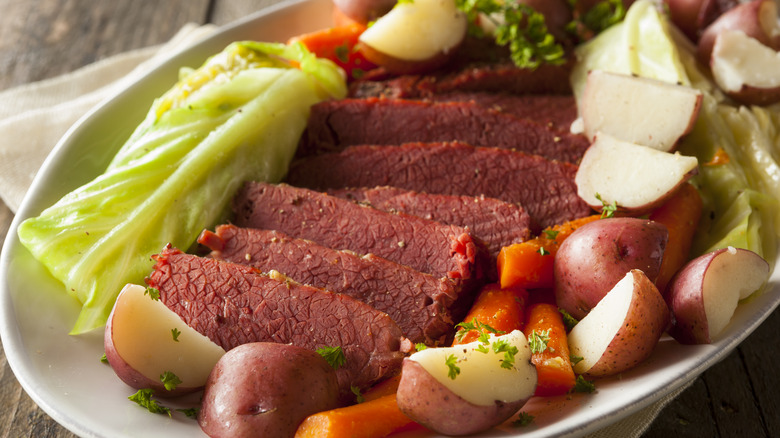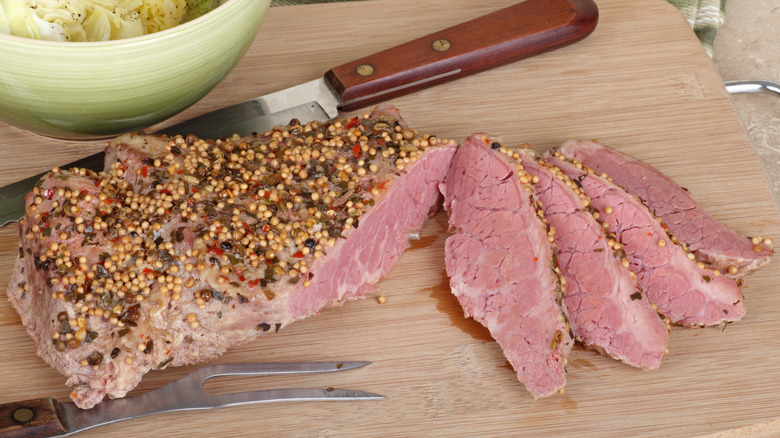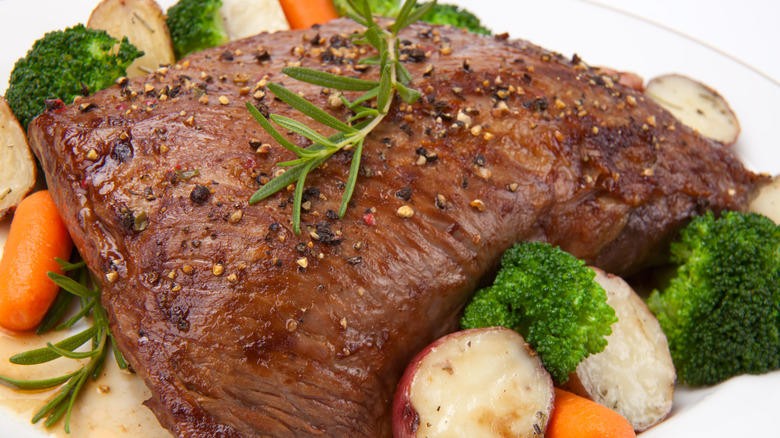Do You Actually Lose Flavor When You Rinse Corned Beef?
How exactly can you make the best corned beef when you rarely ever cook it? Every St. Patrick's Day, Americans everywhere break out their corned beef and cabbage. And the entire month of March, restaurants and shops make sure to stock corned beef and other Irish foods. Although the Irish don't necessarily eat corned beef on St. Patrick's Day, if there's one thing you can count on in America, it's a delicious corned beef meal — but only when the corned beef is prepared correctly.
"To rinse or not to rinse?" is one of the major questions that consistently stumps cooks who make corned beef just once a year. Some cooks may think that rinsing corned beef before cooking it also rinses all of that savory, briny flavor down the drain, but is that actually true? It turns out that the matter of rinsing corned beef is not exactly what many people think — but no matter what, there's still a surefire way to make a crowd-pleasing corned beef dinner.
The answer to this age-old question might seem to defy conventional thinking. Yes, you should absolutely wash corned beef. As a matter of fact, opting not to might be a one-way ticket to flavor disaster.
Washing corned beef removes excess salt and improves its flavor
Corned beef is salty, especially after you brine it in the refrigerator for a while. Even straight out of the package, corned beef has a significant amount of salt, so if you cook it as is or after brining it without giving it a good rinse, you'll be choking down dinner and begging for water. Always rinse corned beef once you take it out of the package — it'll remove some of the meat's excess salt and also improve the overall flavor.
And of course, since that brine is salty too, rinse the slab of corned beef after you take it out of the solution. You won't miss out on the full flavor profile of the corned beef if you rinse the meat, which is already infused with the flavors you love by the time it hits the sink. You may even find that your corned beef tastes so good that you'll want to repeat that simple step every year.
How does corned beef get so salty?
Now you know how to deal with all of that extra salt on your corned beef. But how does corned beef get so salty in the first place?
Corned beef's manufacturing process packs in all of that salt you'll need to rinse off later. The brisket that will eventually become your St. Patrick's Day dinner is cooked in salted water and spices. It's also packaged in lumps of salt — and it's actually named for the "corns" of salt in its packaging.
But why is corned beef saturated in salt? Salt is a preservative, so it allows you to keep corned beef for longer and even can it if you want. The salt brine originated as a way to keep meat good for longer, making it a good shelf-stable meat option for people living without refrigeration. So today, in most American homes, rinsing that excess salt off your corned beef may feel like an annoying extra step because if you use the corned beef right away, there's really no need for all of that salt to be there. Thankfully, rinsing corned beef before you cook it doesn't take away any flavor; on the contrary, it prevents your holiday spread from tasting like pure salt. Want a happy St. Patrick's Day? Just rinse your corned beef — it'll be worth your time.


